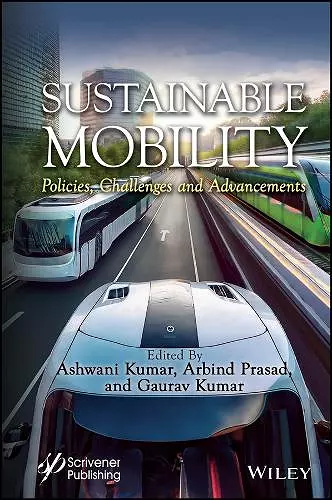Sustainable Mobility
Policies, Challenges and Advancements
Gaurav Kumar editor Ashwani Kumar editor Arbind Prasad editor
Format:Hardback
Publisher:John Wiley & Sons Inc
Published:29th Nov '24
£156.00
Supplier delay - available to order, but may not be available until after 2nd June 2025.

This book is essential for anyone interested in understanding and implementing sustainable transportation practices, as it provides comprehensive insights into the challenges, advancements, and policies related to sustainable mobility.
Sustainable transportation refers to any means of transportation that is “green” and has a low impact on the environment. The goal of sustainable transportation is to balance our current and future needs. As per the United Nations Brundtland Commission (WCED, 1987), sustainable mobility can be defined as “mobility that satisfies the needs of present generations without compromising future generations”, but in the modern era, we are compromising the needs of the next generation in terms of pollution, depletion of fossil fuels, global warming, poor air quality, and hazardous gases. The three main pillars of sustainability, economics, environment, and social issues, are crushed by modern development, so there is a need to shift from traditional means of transportation to sustainable transportation.
Under the vision of sustainable mobility, better infrastructure and services will be provided to support the movement of goods and people. This outcome will be achieved only if four goals are pursued simultaneously: developing the right policy, building awareness, developing intelligent transportation, and creating green vehicles. Sustainable Mobility: Policies, Challenges and Advancements will discuss transitions from conventional to sustainable mobility, infrastructure development challenges in this transition period, new vehicle policies, and the latest autonomous vehicles for intelligent transportation. The main highlights of the book are energy efficient technologies for transportation, accessibility and safety of the transport system, environmental footprint, health impacts, economic development, and social growth. Sustainable mobility is essential to economic and social development.
The environmental impacts of transport can be reduced by reducing the weight of vehicles, creating sustainable styles of driving, reducing the friction of tires, encouraging electric and hybrid vehicles, improving the walking and cycling environment in cities, and enhancing the role of public transport, especially electric vehicles. Going green and sustainable is not only beneficial for the company, but it also maximizes the benefits of an environmental focus in the long term.
ISBN: 9781394166145
Dimensions: unknown
Weight: 699g
336 pages